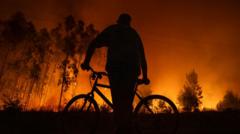The recent victory of Donald Trump, a known climate skeptic, has raised alarms among environmentalists regarding the future of climate action both in the U.S. and globally. With the COP29 UN climate talks approaching, analysts warn that his presidency could mark a significant roadblock in the fight against climate change.
Trump’s Win Signals Setback for Climate Initiatives, Say Analysts

Trump’s Win Signals Setback for Climate Initiatives, Say Analysts
Experts believe Donald Trump's election as President will stall climate change efforts both domestically and internationally, especially ahead of the upcoming UN climate talks.
Trump’s track record includes a prior withdrawal from the Paris Agreement, which united nations in a commitment to reduce greenhouse gas emissions. Should he choose to disconnect the U.S. from the agreement again, it would provide him nearly four years of unfettered power to direct environmental policies without accountability to international norms.
Experts like Professor Richard Klein have emphasized that the U.S. delegation will effectively be a “dead duck” at the upcoming COP talks. This retreat may undermine not only the U.S.’s credibility but may also dissuade other major players, including China, from making commitments toward climate financing. Under Trump’s leadership, the involvement of the U.S. in climate financing schemes aimed at assisting developing countries will likely diminish, leaving them in a precarious position as they strive for net-zero emissions.
While anticipation grows over the Trump administration's oil and gas exploration initiatives, there remains uncertainty about its impact on the burgeoning renewable energy sector. With the International Energy Agency projecting a doubling of investments in clean technology by 2024, analysts like Dan Eberhart believe that Trump’s policies might not deter long-term green investment trends.
Some within Trump's base have even expressed desires to withdraw from UN climate conventions altogether, which adds an additional layer of uncertainty surrounding U.S. participation in international climate efforts. Nonetheless, hope remains among climate activists and leaders that the shift towards decarbonization will continue despite the political turbulence. As former UN climate chief Christiana Figueres put it, the outcome of the election will certainly challenge global climate initiatives, but it will not completely derail the momentum toward a sustainable future.
Experts like Professor Richard Klein have emphasized that the U.S. delegation will effectively be a “dead duck” at the upcoming COP talks. This retreat may undermine not only the U.S.’s credibility but may also dissuade other major players, including China, from making commitments toward climate financing. Under Trump’s leadership, the involvement of the U.S. in climate financing schemes aimed at assisting developing countries will likely diminish, leaving them in a precarious position as they strive for net-zero emissions.
While anticipation grows over the Trump administration's oil and gas exploration initiatives, there remains uncertainty about its impact on the burgeoning renewable energy sector. With the International Energy Agency projecting a doubling of investments in clean technology by 2024, analysts like Dan Eberhart believe that Trump’s policies might not deter long-term green investment trends.
Some within Trump's base have even expressed desires to withdraw from UN climate conventions altogether, which adds an additional layer of uncertainty surrounding U.S. participation in international climate efforts. Nonetheless, hope remains among climate activists and leaders that the shift towards decarbonization will continue despite the political turbulence. As former UN climate chief Christiana Figueres put it, the outcome of the election will certainly challenge global climate initiatives, but it will not completely derail the momentum toward a sustainable future.



















